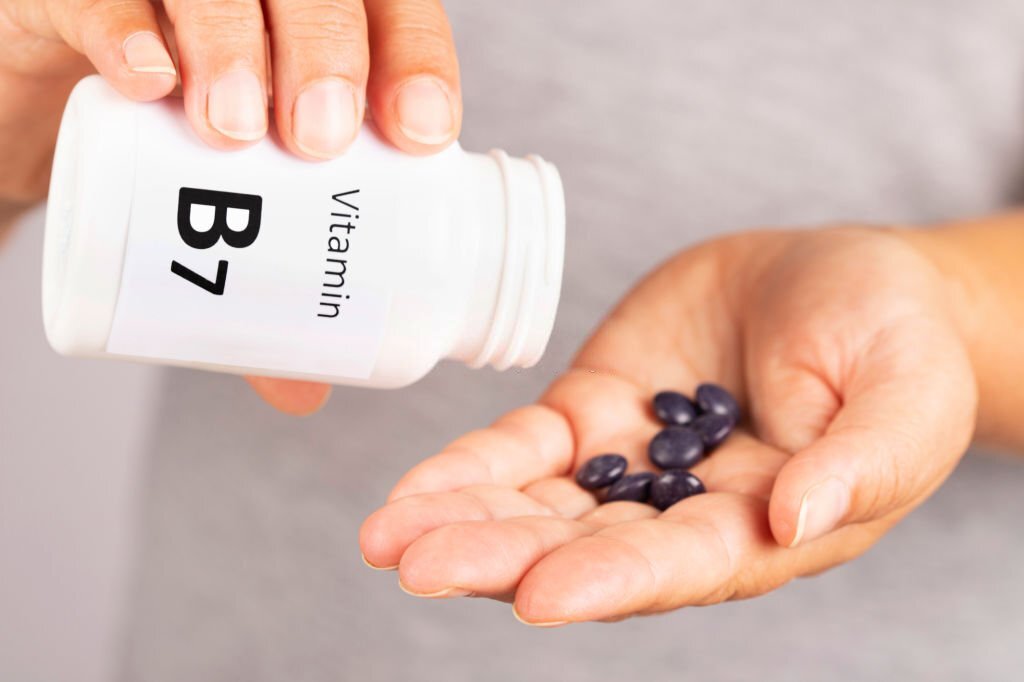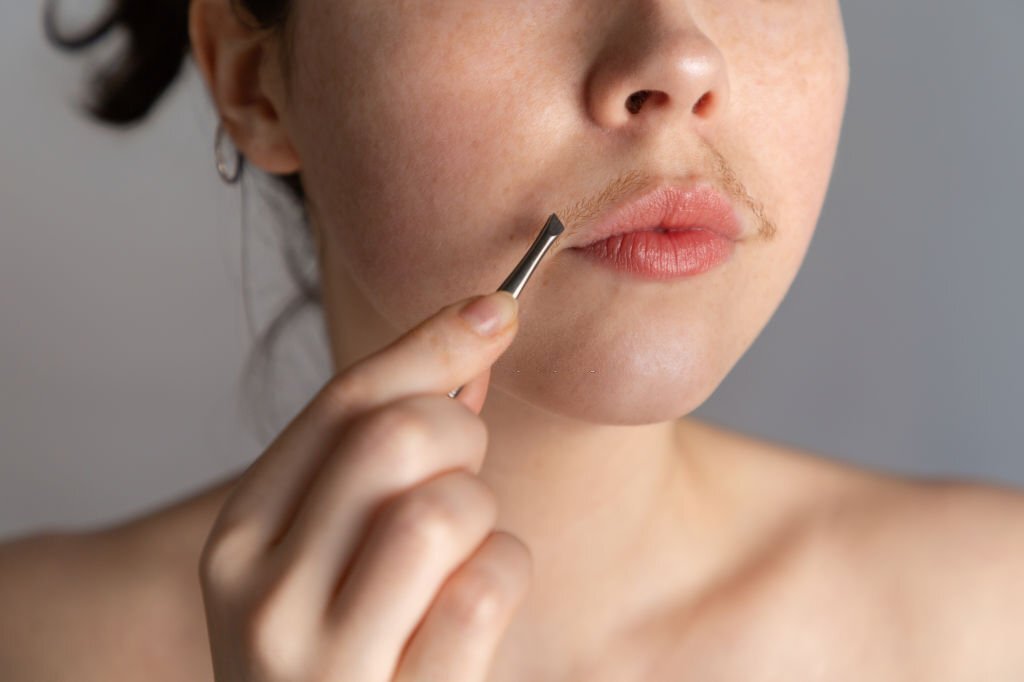While we all want thick, shiny, and beautiful hair, we rarely dream of having a Gandalf-like beard because of it.
Jokes apart – you will not have that long a beard; however, taking hair supplements, such as biotin, always evokes the fear of facial hair in many. So does biotin increase facial hair in females?
No conclusive evidence exists that biotin can cause or increase female facial hair growth. Genetic and hormone levels primarily influence facial hair growth, including androgen. Biotin does not directly affect these hormones or stimulate hair follicles to produce more hair.
However, there’s more to the hair story. Let’s explore together.
Does Biotin Increase Facial Hair In Females?
There is no conclusive evidence that biotin can directly increase facial hair growth in females.
Facial hair growth in females is primarily influenced by hormonal factors, particularly androgens, including testosterone. Androgens are responsible for developing male secondary sexual characteristics, including facial hair growth.
In women, the levels of androgens are typically lower than in men, and facial hair growth is usually limited to fine, vellus hairs.
Biotin, the vitamin B7 is a water-soluble vitamin that plays a role in critical metabolic pathways such as gluconeogenesis, fatty acid synthesis, and amino acid catabolism. Its function doesn’t influence androgen in females.
This nutrient is also essential for various bodily functions such as creating cells, regulating gene expression, managing the immune system and inflammation, and supporting the growth and development of embryos.
While biotin deficiency can lead to hair loss or brittle hair, the study suggests that taking biotin supplements or increasing biotin intake through diet does not result in excessive or increased hair growth. So, it may not grow or increase your facial hair, either.
According to one study, women taking biotin supplements had lower levels of prolactin and estrogen, two hormones in female reproduction. But it has nothing to do with your facial hair.
Does Biotin Increase Body Hair?
Biotin does not directly affect body hair growth. Many factors, such as genetics, hormones, age, and health conditions, influence body hair growth. Biotin may help improve the quality and strength of your body hair, but it will not make it grow faster or thicker.
If you have excessive or unwanted body hair growth, you may want to consult a doctor to rule out any underlying causes or treatments.

Does Biotin Make Hirsutism Worse?
There is little evidence that biotin interferes with hirsutism or hair loss related to PCOS, a common cause of hirsutism.
Can you take zinc for PCOS – discover.
Hirsutism is a condition that causes excess hair growth on the face and body, especially in women. It is usually caused by high levels of androgens, which are male hormones that can also affect hair loss on the scalp.
Biotin doesn’t affect androgen or hormones causing facial hair in women.
What Causes Facial Hair Or Hirsutism In Females?
Hirsutism, or the excessive growth of hair in women, particularly in areas where men typically have hair (such as the face). According to the survey, around 5% to 10% of women and people assigned female at birth who are of childbearing age are affected by this condition. Additionally, more than 40% of women experience it at some point.
The most common cause of hirsutism is increased androgens, which are male hormones also present in women but in smaller amounts.
Here are some factors that can contribute to hirsutism.
- Polycystic ovary syndrome (PCOS)
- Family history
- Hormonal imbalances
- Medications such as anabolic steroids, minoxidil, etc.
- Medical conditions like adrenal gland disorders or tumors
- Insulin resistance.
How To Treat Facial Hair In Females?
Most women start with an oral contraceptive (birth control pill). All birth control pills work about the same for hirsutism. If there’s no improvement after six months, physicians may add a second medication, antiandrogen.
There are effective hair removal methods, such as electrolysis or laser removal, but they can be costly. Continue taking your medication to prevent hair growth with the therapy. Laser therapy is most effective for women with fair skin and dark hair.
Your doctor may recommend using eflornithine cream that disrupts a chemical in hair follicles beneath the skin and slows hair growth.
What Vitamins Help Stop Facial Hair Growth?
Women experience excess hair growth due to high androgen levels. Several supplements can help reduce the effects of this hormone, potentially leading to a decrease or complete stop in facial hair growth, such as progesterone, saw palmetto, vitamins B6 and E, spearmint tea, and magnesium and zinc supplements.
Learn the effect of taking vitamin E with magnesium.
A trial showed that taking magnesium, zinc, calcium, and vitamin D supplements over 12 weeks improves hirsutism symptoms significantly. It also reported decreased facial hair growth.
Check the proper ratio of magnesium and calcium.
Vitamin E can stop androgens from doing their job and lower the body’s testosterone. It can control how much androgen is made, making testosterone less effective. Check if vitamin E can boost antioxidant effects.
Does Biotin Help Hair Growth?
Some believe that taking biotin supplements can help promote hair growth. However, there is limited scientific evidence to support this claim.
One study found that people with a biotin deficiency were more likely to experience hair loss than those without a deficiency. However, the study did not find that biotin helped people with normal biotin levels grow more hair.
Some studies suggest that biotin may help with hair loss caused by alopecia areata.
A study found that women with thinning hair improved their hair’s thickness and growth after taking a multivitamin with biotin. It’s hard to determine if the improvement was solely because of biotin since the multivitamin had other ingredients.
Overall, the research on biotin and hair growth is inconclusive. More research is needed to determine whether biotin supplements can help promote hair growth in people with normal biotin levels.
Does Biotin Help Prevent Hair Loss?
According to research, biotin supplements may prevent hair loss and promote hair growth only in people with a biotin deficiency. However, the study is limited.
According to another study, even if there is a lack of biotin supplements may not stop hair loss.
As part of a study, 22 patients who had undergone gastric sleeve surgery and had low biotin levels were given biotin supplements to help with hair loss. After 3 months, 5 patients experienced a significant decrease in hair loss, 14 reported a minor improvement, and 3 saw no noticeable change. Factors beyond biotin may also contribute to hair loss and its prevention.

How Much Biotin To Take For Hair Growth?
The amount of biotin recommended for hair growth can vary based on different factors, such as the source of the information, age, health, and whether or not there is a biotin deficiency.
Some recommend 30-100 mcg/day for adults. Others suggest 100-1,000 mcg/day or up to 5,000 or 10,000 mcg/day. For breastfeeding women, the recommended dosage is 35 mcg.
A 5-30 mcg daily intake may be enough for children or infants.
Taking biotin in the morning with a full glass of water is recommended for optimal results. Taking biotin on an empty stomach, either 1 hour before eating or 2 hours after your last meal, is best to ensure better absorption.
How Long Does It Take To See Results From Taking Biotin Supplements?
The effects of biotin supplements on hair growth differ depending on the person and the extent of their hair loss. A few individuals may notice a difference in as little as three months.
However, biotin supplements do not guarantee hair loss remedies and work differently for each person.
What happens If You Take Too Much Biotin?
Studies have shown that a high biotin intake does not appear toxic in humans. In fact, daily doses of 10-50 mg of biotin have been found to have no adverse effects.
Consuming high levels of biotin can lead to inaccurate lab test results, either showing falsely high or low levels depending on the specific test, such as hormone tests and tests for markers of heart attacks. Incorrect results can result in improper patient management or misdiagnosis of a medical condition.
Final Thought
Does biotin increase facial hair in females? No, biotin doesn’t directly cause facial hair in females. Facial hair results from excess androgen in females, which biotin doesn’t influence. So, if you have facial hair, consult your doctor for a proper diagnosis.
For more on supplements, visit our blogs.

I am a health and wellness enthusiast working in a Pittsburgh-based wellness clinic. My primary role as a consultant is to tailor a balanced lifestyle for my patients, where positive steps and potent supplements play a synergistic role.

